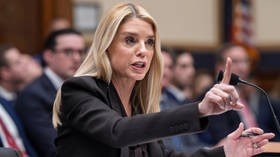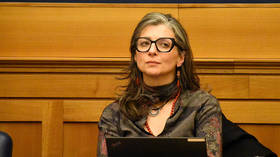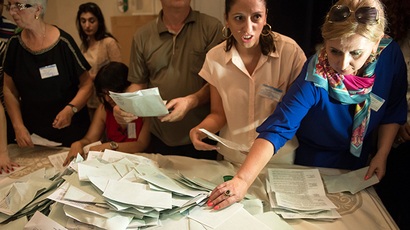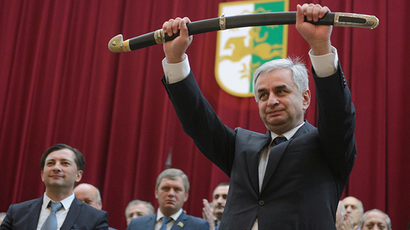Collective defense partnership: Russia, Abkhazia sign alliance
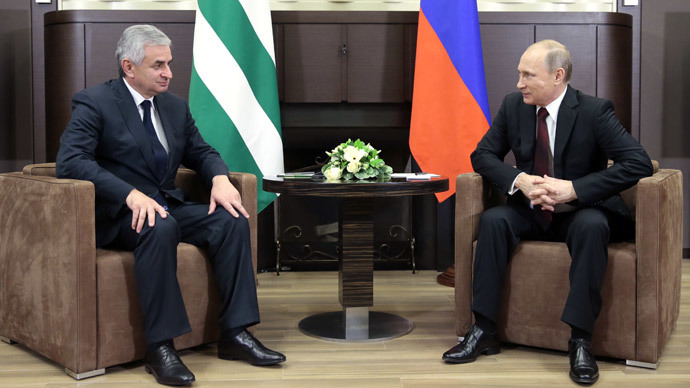
Russia and Abkhazia have signed a new partnership agreement, which includes a collective defense system, and extra aid to the former Georgian region. The Georgian opposition blamed its government for failing to prevent the signing of the document.
President Vladimir Putin and his Abkhazian counterpart Raul Khajimba, who was elected president in August, sealed the treaty on Monday in Sochi.
The new agreement supersedes an older document adopted back in 2008, when Russia recognized Abkhazia as an independent state after an ill-fated attempt by Georgia to seize control of the region along with South Ossetia.
Both of them had been de facto independent from Tbilisi since the early 1990s, when local residents had to take up arms and fight against troops sent by a nationalistic Georgian government. In 2008, President Mikhail Saakashvili launched another attempt to seize the breakaway regions through military force, killing Russian peacekeepers deployed in Georgia and provoking an intervention from Russia.
The new treaty establishes a fresh mechanism for Abkhazia’s defense. The countries pledge mutual protection from foreign aggression, similar to how the North-Atlantic Treaty Organization (NATO) operates.
Russia is to fund a 3-year modernization of the Abkhazian army and establish a joint Russian-Abkhazian force. It will also erect defenses along Abkhazia’s border with Georgia to discourage aggression in the future.
Internationally, Russia pledges to continue its work to have Abkhazia recognized by other nations and international organizations. So far Nicaragua, Venezuela and Nauru have done so, following Russia’s lead, while two other nations, Vanuatu and Tuvalu, withdrew their declaration after initial recognition.
Moscow is also expanding its aid programs to Abkhazia, co-funding social spending on education, healthcare, retirement pensions and other areas. Russia’s aid to Abkhazia will double last year’s, Putin said while meeting Khajimba.

Abkhazia’s capital, Sukhum, will work to harmonize its local legislation with the norms of the Eurasian Economic Union, an early EU-like integration project that currently includes Russia, Belarus, Kazakhstan and Armenia. Kyrgyzstan is considering joining the union.
On his way to Sochi, Khajimba said he was doing it “with a feeling of a job well done and optimism.” He stressed that the agreement further strengthens Abkhazia’s sovereignty and security.
Not all Abkhazians agree, however. The opposition party, Amtsakhara, staged a rally in Sukhum to protest. They believe the document gives Russia too much leverage on Abkhazia’s internal affairs.
“A treaty cannot be called a partnership agreement, if it de facto places one of the parties on the other’s payroll,” the party said in a statement on Sunday.
Nevertheless, Amtsakhara aren’t objecting to Russia providing defense to Abkhazia – only to the degree of economic integration the treaty demands for. The Abkhazian government disagrees with the criticism.
“We deliberately took this issue for open public discussion to set transparency further in practice, which we called for when we were in the opposition, and to make society feel responsible for Abkhazia’s future,” Khajimba said. “I knew it would be used for political speculations, and it was. But in the end our people won from it.”
Meanwhile, in Georgia the impending signing of the treaty sparked protest among ex-President Saakashivily supporters, who staged a mass rally earlier this month.
They accused Prime Minister Irakly Garibashvili’s government of failing to do enough to oppose the document and said Russia was preparing to annex Abkhazia.

"This is the clear message from the Georgian public that we will never accept the fact of our sovereignty being dismantled by Putin's Russia," Giga Bokeria, one of the leaders of Saakashvili’s United National Movement, told Reuters during the march.
The ex-president, who is wanted in Georgia on charges of using budget money to lead a lavish lifestyle while in office, and is also being investigated over a brutal police crackdown on an opposition rally, spoke to the demonstrators via a live broadcast.
"We should show the government that our nation is united, even when it faces a big threat, and when it's about our freedom, future and independence," he said.
Garibashvili’s government says it wants closer integration with the EU, but also wants to mend the rift with Russia caused by Saakashvili’s two presidential terms. Since his presidency in Georgia, the two countries have renewed direct flights between Moscow and Tbilisi, brought back Georgian goods to Russian markets and taken other cautious steps towards reconciliation.


